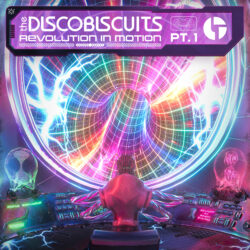Music Interview: Disco Biscuits Redux — “Revolution in Motion”
By Scott McLennan
The Disco Biscuits’ improvisations are not driven by a guitar-rock root: they are more apt to dive into a piece of classical music and then ease into a propulsive dance-club beat that eventually swerves into Zappa-style brainy grime.

The Disco Biscuits. Photo: courtesy of the artist
The Disco Biscuits turn 30 years old in 2025, an age when most bands have settled into a set songbook and ways of doing things. But not this group: over the past year the band has been on a creative tear, writing, recording, and releasing new songs after a long drought. Revolution in Motion, a double-album “space opera,” is being released on March 29; it is the band’s first full-length release since 2011’s Otherwise Law Abiding Citizens.
The new material continues plowing an experimental track this band has been on from the start. Known for combining free-flowing improvisation and more structured electronic music elements (such as samples and programmed beats), Disco Biscuits is a paradox: it is a heavyweight in the jam-band scene, yet, given its “trance fusion” sound, the band is also something of an outlier in that musical universe. Often, improvisations are not driven by a guitar-rock root: the Biscuits are more apt to dive into a piece of classical music and then ease into a propulsive dance-club beat that eventually swerves into Zappa-style brainy grime.
Formed by guitarist Jon Gutwillig, bassist Marc Brownstein, keyboard player Aron Magner, and drummer Sam Altman when they were undergrads at the University of Pennsylvania, Disco Biscuits developed its sound playing fraternity parties and bars around Philadelphia. Altman left the band in 2005 and was replaced by current drummer Allen Aucoin.
Disco Biscuits maintained a busy touring and recording schedule up to 2011. After that the band performed sporadically until 2019, when it mapped out a series of concerts (some of which were derailed by the pandemic). The group is now in the midst of one of its biggest road trips since declaring “set break is over.” The lengthy “Why We Dance” tour has the band playing March 14 at College Street Music Hall in New Haven, CT, March 15 at the State Theater in Portland, ME, and March 16 at the House of Blues in Boston. Karina Rykman is opening all three shows.
I sent a few questions by email to Aron Magner about the new record and the tour.

Arts Fuse: Over the past year — and even before that — the band has introduced a lot of new material and seems to be pushing itself to be even more exploratory in concert. What sparked the creative burst?
Aron Magner: There’s no solitary factor for the creative burst. More of an amalgamation of each of us being in a good place in our lives, coupled with positive band dynamics and a long dormant potential for collaboration.
AF: What was it like making a new studio album? Was there ever a point when you thought albums aren’t worth the effort? Why not just release the live shows? Did you work with specific producers and what was the band shooting for in presenting studio versions of these songs?
Magner: Art and music is always worth it if you derive fulfillment from it. The landscape of how people consume music is definitely counterintuitive to the desire to make a full-length album, let alone a double album like this “space opera.” But at the end of the day, we’re artists and that’s what we do.
We use the studio and the demos we make there as a springboard to keep our live shows fresh. We’ve been very lucky that each song that we’ve debuted live from this album has been very well received by the fan base. Typically fans just want the songs they know and are resistant to new music, at least until the new music becomes the older music. Our fan base gave us the support and faith we needed to continue to write and develop this album.

The Disco Biscuits in 2016 performing at Montage Mountain. Photo: Dave Vann
AF: The “Hot Air Balloon” rock opera and “The Very Moon” musical and the new album all have narrative plots — what draws you to those kinds of projects?
Magner: Writing to an already conceptualized story makes it easier to begin to write the actual songs. For Revolution in Motion, we were able to discuss the intention of each song in advance. We were able to understand character motivation and the parts of the story that needed to then be translated into music and lyrics. Interestingly, the last song on the new album, “To Be Continued,” was our hardest song to bring to life. Other than the title, we didn’t know anything else about what we wanted to convey. And just as magically the other songs came together in the end, we tapped into a vibe to close the album that leaves you with that feeling of hope and continuation into the unknown.
AF: How much of a set does the band map out before hitting the stage and how much just unfolds unplanned during the show?
Magner: We map out the checkpoints of the set. Marc (bass) has been putting a lot of advance attention to the fluidity of the sets. Making sure that not just the beginning and end of the sets are big moments, but also mapping out our fluctuating tempos. Once the goal posts are in place for the set, it enables the band a lot more freedom to improvise and be in the moment because we don’t need to think about the minutiae that’s been discussed in advance.
AF: A recent Tractorbeam show in Colorado was pretty spectacular. it really leaned into the “ ’tronica” aspect of the band’s “livetronica” label. Has the band ever done or considered doing something completely (or mostly) “unplugged?”
Magner: You’re talking to the right guy! I have always wanted to do an unplugged or “mostly acoustic” show. During the pandemic, one of my pivots was to sell private Zoom concerts. It got me doing these solo piano arrangements of lots of Biscuit songs. I love to reimagine these songs that I’ve been playing for so many years with a different arrangement. They take on a new life. And it’s a joy to witness how songs can take on new meaning and continue to evolve over the years.
Scott McLennan covered music for the Worcester Telegram & Gazette from 1993 to 2008. He then contributed music reviews and features to the Boston Globe, Providence Journal, Portland Press Herald, and WGBH, as well as to the Arts Fuse. He also operated the NE Metal blog to provide in-depth coverage of the region’s heavy metal scene.

